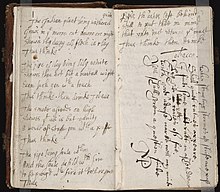
When our visitor was silent Holmes stretched out his hand and took down letter "S" of his commonplace book.
The Return of Sherlock Holmes by Doyle, Sir Arthur Conan
It was Sherlock Holmes who first introduced me to the "commonplace book" - it was Jeff Bezos who gave me one.
Commonplace books (or commonplaces) were a way to compile knowledge, usually by writing information into books. They became significant in Early Modern Europe.
"Commonplace" is a translation of the Latin term locus communis (from Greek tópos koinós, see literary topos) which means "a theme or argument of general application", such as a statement of proverbial wisdom. In this original sense, commonplace books were collections of such sayings, such as John Milton's commonplace book. Scholars have expanded this usage to include any manuscript that collects material along a common theme by an individual.
Such books were essentially scrapbooks filled with items of every kind: medical recipes, quotes, letters, poems, tables of weights and measures, proverbs, prayers, legal formulas. Commonplaces were used by readers, writers, students, and scholars as an aid for remembering useful concepts or facts they had learned. Each commonplace book was unique to its creator's particular interests. (http://en.wikipedia.org/wiki/Commonplace_book)
Thanks to my Kindle I've now collected hundreds of notes and clippings. Everything noted and highlighted - IF I got the book from Amazon - lives on http://kindle.amazon.com - that was the start.
And then I discovered Findings.com - a place I could collect ALL my kindle-quotes. Not only that, but I could highlight texts on the web and paste THEM into my findings. This was terrific, because Findings let me publish to Twitter, Facebook and Tumblr. And the material could be searched as well - this put organization into the content that made it more useful than ever. I was well on my way to being as organized as Sherlock Holmes!
But - something was missing. Many of my books come from Gutenberg.org, or Baen.com, or Instapaper.com. How could I add them to my findings?
This isn't a problem - that is, Kindle maintains a file "My Clippings.txt" that logs all of your highlights and notes - whether Amazon-sourced material or not. It's a plain text file you can copy off of your Kindle - the trick is getting THAT into a format that Findings.com will let you clip.
And for that, I have a solution - several, in fact!
... Stay tuned....

This post really made me think about vision health. Have you ever checked your color vision? Try this color blind test and find out!
ReplyDeleteVisit: Color blind test
ReplyDelete